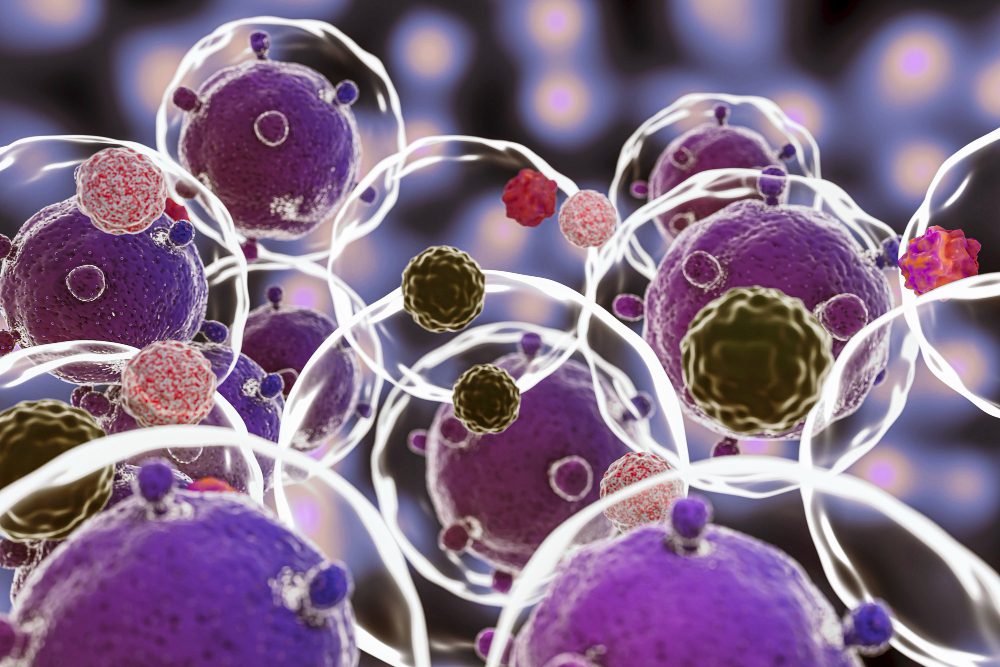Targeted Therapy: Precision Strikes Against Viral Cancers / 靶向治疗:精准打击病毒性癌症
Targeted therapy, a cornerstone of modern oncology, has shown immense promise in treating viral cancers by specifically interfering with molecular pathways crucial for tumor growth and survival. In China, research and clinical applications of 靶向治疗 have expanded significantly. For instance, in HBV-related hepatocellular carcinoma (HCC), multi-kinase inhibitors like sorafenib and lenvatinib have been widely used, improving patient outcomes. Beyond these, emerging targets related to viral proteins or host pathways hijacked by viruses are under intense investigation. Researchers are exploring inhibitors that specifically block viral replication or modulate the host immune response in a targeted manner. The development of new small-molecule drugs and monoclonal antibodies designed to neutralize viral oncoproteins or disrupt their signaling cascades represents a significant area of 创新药物 development within China. These advancements underscore a commitment to precision medicine, aiming for fewer side effects and higher efficacy.
中文: 靶向治疗作为现代肿瘤学的基石,通过特异性干扰肿瘤生长和生存至关重要的分子通路,在治疗病毒性癌症方面展现出巨大潜力。在中国,靶向治疗的研究和临床应用已显著扩展。例如,在乙肝病毒相关的肝细胞癌(HCC)中,索拉非尼和仑伐替尼等多激酶抑制剂已被广泛使用,改善了患者预后。除此之外,与病毒蛋白或病毒劫持的宿主通路相关的新兴靶点正在被深入研究。研究人员正在探索特异性阻断病毒复制或以靶向方式调节宿主免疫反应的抑制剂。旨在中和病毒致癌蛋白或破坏其信号级联反应的新型小分子药物和单克隆抗体的开发,代表了中国创新药物发展的一个重要领域。这些进展强调了对精准医疗的承诺,旨在减少副作用并提高疗效。
Immunotherapy: Unleashing the Body's Defenses / 免疫治疗:释放身体的防御
Immunotherapy has revolutionized cancer treatment, and its impact on viral cancers in China is particularly profound. Given that many viral cancers are inherently immunogenic, therapies that boost the body's own immune system to recognize and destroy cancer cells hold great potential. Immune checkpoint inhibitors (ICIs), such as PD-1/PD-L1 antibodies, have demonstrated remarkable 临床试验成果 in various viral-associated malignancies, including HCC, nasopharyngeal carcinoma (NPC), and cervical cancer. China has been at the forefront of developing its own domestic ICIs, contributing significantly to the global landscape of 免疫治疗. Beyond ICIs, adoptive cell therapies like CAR-T cell therapy are being explored for viral-associated tumors, with promising early results in specific contexts. The integration of immunotherapy with other modalities, such as chemotherapy or radiotherapy, is also being actively investigated to achieve synergistic effects. This holistic approach is crucial for developing more effective and durable responses, reflecting the spirit of Deep Science Innovation.
中文: 免疫治疗彻底改变了癌症治疗,其对中国病毒性癌症的影响尤为深远。鉴于许多病毒性癌症本身具有免疫原性,那些能增强人体自身免疫系统识别和摧毁癌细胞的疗法具有巨大潜力。免疫检查点抑制剂(ICIs),如PD-1/PD-L1抗体,在各种病毒相关恶性肿瘤,包括肝细胞癌、鼻咽癌和宫颈癌中,已展现出显著的临床试验成果。中国一直走在开发国产ICIs的前沿,为全球免疫治疗格局做出了重要贡献。除了ICIs,针对病毒相关肿瘤的过继细胞疗法,如CAR-T细胞疗法,也在探索中,在特定情况下取得了有希望的早期结果。免疫治疗与其他模式(如化疗或放疗)的结合也在积极研究中,以实现协同效应。这种整体方法对于开发更有效和持久的反应至关重要,体现了深度科学创新的精神。
China's New Therapies and Innovative Drug Development / 中国新疗法与创新药物开发
China is rapidly becoming a global leader in the development of 中国新疗法 and 创新药物 for viral cancers. This includes not only the independent development of novel molecular entities but also significant advancements in traditional Chinese medicine (TCM) integrated with modern oncology. Oncolytic viruses, genetically engineered viruses that selectively infect and lyse cancer cells, represent a particularly exciting area. China has approved its own oncolytic virus therapies, demonstrating a unique approach to harnessing viral biology for therapeutic gain. Furthermore, gene therapies aimed at correcting genetic defects or enhancing anti-tumor immunity are gaining traction. The focus on developing therapies that are tailored to the specific genetic and viral profiles prevalent in the Chinese population is leading to the emergence of truly 个性化方案. This commitment to indigenous research and development is fostering a vibrant ecosystem for biotechnological advancements, pushing the Deep Science Frontiers.
中文: 中国正迅速成为病毒性癌症中国新疗法和创新药物开发的全球领导者。这不仅包括新型分子实体的独立开发,还包括将中医药与现代肿瘤学相结合的重大进展。溶瘤病毒——经过基因工程改造、选择性感染和裂解癌细胞的病毒——是一个特别令人兴奋的领域。中国已批准了自己的溶瘤病毒疗法,这展示了利用病毒生物学实现治疗增益的独特方法。此外,旨在纠正基因缺陷或增强抗肿瘤免疫力的基因疗法也越来越受到关注。专注于开发针对中国人群中普遍存在的特定基因和病毒特征的疗法,正在催生真正的个性化方案。这种对本土研发的承诺正在培育一个充满活力的生物技术进步生态系统,推动着深度科学前沿。
Clinical Trial Outcomes and Personalized Solutions / 临床试验成果与个性化方案
The robust clinical trial landscape in China is pivotal to the rapid translation of scientific discoveries into patient benefits. Numerous 临床试验成果 are continually being published, showcasing the efficacy and safety of new treatments for viral cancers. These trials often focus on specific patient populations and viral subtypes prevalent in China, leading to highly relevant and impactful data. The emphasis on 个性化方案 is growing, driven by advancements in genomics, proteomics, and bioinformatics. By analyzing a patient's unique tumor characteristics, including viral integration patterns and host genetic predispositions, clinicians can select the most appropriate 靶向治疗 or 免疫治疗. This precision oncology approach ensures that patients receive therapies optimized for their specific disease, maximizing therapeutic benefit while minimizing adverse effects. The integration of big data and artificial intelligence is further enhancing the ability to develop and refine these personalized strategies, reflecting the power of Deep Science Technology.
中文: 中国强大的临床试验环境对于将科学发现迅速转化为患者利益至关重要。大量的临床试验成果不断发表,展示了病毒性癌症新疗法的疗效和安全性。这些试验通常侧重于中国普遍存在的特定患者群体和病毒亚型,从而产生了高度相关且有影响的数据。随着基因组学、蛋白质组学和生物信息学的进步,对个性化方案的重视日益增加。通过分析患者独特的肿瘤特征,包括病毒整合模式和宿主遗传易感性,临床医生可以选择最合适的靶向治疗或免疫治疗。这种精准肿瘤学方法确保患者接受为其特定疾病优化的疗法,最大限度地提高治疗益处,同时最大限度地减少不良反应。大数据和人工智能的整合进一步增强了开发和完善这些个性化策略的能力,体现了深度科学技术的力量。
The Role of Deep Science in Viral Oncology / 深度科学在病毒肿瘤学中的作用
The progress in viral cancer treatment in China is inextricably linked to the relentless pursuit of Deep Science Frontiers. Institutions and researchers are pushing the boundaries of basic science, unraveling the complex interplay between viruses and host cells, identifying novel biomarkers, and understanding resistance mechanisms. This fundamental research forms the bedrock upon which all clinical advancements are built. Deep Science Innovation is evident in the creative approaches to drug discovery, from high-throughput screening of compounds to the design of sophisticated gene-editing tools. Furthermore, the application of Deep Science Technology, such as advanced imaging techniques, single-cell sequencing, and computational modeling, is accelerating the pace of discovery and enabling a more comprehensive understanding of viral carcinogenesis. This synergy between basic research, innovative development, and cutting-edge technology positions China as a formidable force in the global fight against viral cancers, promising a future with more effective and accessible treatments.
中文: 中国病毒性癌症治疗的进展与对深度科学前沿的不懈追求密不可分。机构和研究人员正在突破基础科学的界限,揭示病毒与宿主细胞之间复杂的相互作用,识别新型生物标志物,并理解耐药机制。这项基础研究构成了所有临床进展的基石。深度科学创新体现在药物发现的创造性方法上,从化合物的高通量筛选到复杂基因编辑工具的设计。此外,深度科学技术的应用,如先进的成像技术、单细胞测序和计算建模,正在加速发现的步伐,并使人们对病毒致癌作用有更全面的理解。基础研究、创新开发和尖端技术之间的这种协同作用使中国在全球抗击病毒性癌症的斗争中成为一支强大的力量,预示着未来将有更有效和更易获得的治疗方法。
Challenges and Future Directions in China's Viral Cancer Treatment / 中国病毒性癌症治疗的挑战与未来方向
Despite the remarkable advancements, challenges remain in the widespread implementation and accessibility of cutting-edge viral cancer treatments in China. These include the high cost of some 创新药物, the need for more robust infrastructure for advanced therapies like cell therapies, and ensuring equitable access across diverse regions. Future directions will likely focus on combination therapies that integrate 靶向治疗, 免疫治疗, and other modalities to overcome resistance and achieve more durable responses. The development of biomarkers for predicting treatment response and identifying patients who will benefit most from 个性化方案 will be crucial. Furthermore, expanding the scope of 临床试验成果 to include more diverse patient populations and rare viral cancers will be essential. Continued investment in Deep Science Frontiers and fostering international collaborations will be key to addressing these challenges and realizing the full potential of viral oncology in China, ultimately improving patient outcomes nationwide.
中文: 尽管取得了显著进展,但在中国广泛实施和普及尖端病毒性癌症治疗方面仍面临挑战。这包括一些创新药物的高成本、对细胞疗法等先进疗法更强大基础设施的需求,以及确保不同地区之间的公平可及性。未来的方向可能集中于结合靶向治疗、免疫治疗和其他模式的联合疗法,以克服耐药性并实现更持久的反应。开发用于预测治疗反应和识别最能从个性化方案中受益的患者的生物标志物将至关重要。此外,扩大临床试验成果的范围,纳入更多样化的患者群体和罕见病毒性癌症,也将是必不可少的。持续投资深度科学前沿和促进国际合作将是应对这些挑战、充分发挥中国病毒肿瘤学潜力、最终改善全国患者预后的关键。

